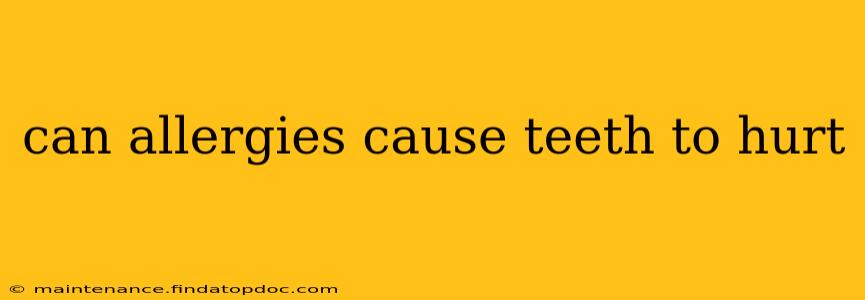Many people experience the misery of allergies, from itchy eyes and runny noses to sneezing fits. But did you know that allergies can sometimes cause seemingly unrelated symptoms, including toothache? While not a direct cause, allergies can trigger a chain reaction in the body that indirectly leads to tooth pain. This article explores the possible connections and helps you understand when to seek professional help.
How Allergies Might Cause Tooth Pain
Allergies trigger an inflammatory response in the body. Histamine, a key player in this response, can cause swelling throughout the body, including in the tissues surrounding your teeth. This swelling can put pressure on sensitive nerves, leading to pain. The pain isn't directly in your teeth, but rather around them, a crucial distinction.
Here's a breakdown of the potential mechanisms:
-
Sinus Pressure: Allergies often lead to sinus inflammation and congestion. Since your sinuses are located near your upper teeth, this pressure can radiate pain into your upper teeth, mimicking a toothache. This is particularly common with maxillary sinusitis.
-
TMJ Dysfunction: Some people experience temporomandibular joint (TMJ) dysfunction, a disorder affecting the jaw joint, as a result of allergy symptoms. The inflammation and swelling associated with allergies can exacerbate TMJ problems, leading to jaw pain that can be misinterpreted as tooth pain.
-
Referred Pain: Nerve pathways are complex. Pain originating in one area can sometimes be felt in another. This is known as referred pain. Inflammation from allergy-related sinus issues can trigger referred pain in the teeth.
What Does Allergy-Related Tooth Pain Feel Like?
The pain associated with allergies is usually different from the sharp, localized pain of a cavity or abscess. It's often described as a dull ache, pressure, or general discomfort, particularly in the upper teeth or jaw. The pain might worsen when allergies are flaring up and improve with allergy medication.
Can Allergies Cause Tooth Sensitivity?
While not directly causing sensitivity, the inflammation and swelling from allergies can indirectly contribute to increased tooth sensitivity. This is because swelling can expose more of the tooth's dentin, which contains tiny tubules leading to the nerves.
What are some common allergy symptoms that might coincide with tooth pain?
Common allergy symptoms that may accompany or precede tooth pain include:
- Nasal congestion: A stuffy or runny nose is a very common allergy symptom.
- Facial pressure: Pressure or pain in the face around the sinuses.
- Headaches: Allergy-induced headaches are also prevalent.
- Watery eyes: This is another typical allergy symptom.
- Sneezing: Frequent sneezing is a common sign of allergies.
- Itchy throat or ears: Allergy irritation can extend to the throat and ears.
How can I tell if my tooth pain is related to allergies?
Differentiating between allergy-related tooth pain and other dental issues is important. If your tooth pain coincides with other allergy symptoms and improves with allergy medication, it's more likely to be allergy-related. However, if the pain is severe, persistent, localized to a single tooth, or accompanied by other dental symptoms (like swelling or pus), consult a dentist immediately.
Should I see a dentist or an allergist if I think my allergies are causing my tooth pain?
It's best to consult both a dentist and an allergist. The dentist can rule out any underlying dental problems, and the allergist can assess your allergies and recommend appropriate treatment. They can work together to provide the most comprehensive care.
What treatments can help relieve allergy-related tooth pain?
Treating the underlying allergy is crucial. Over-the-counter or prescription allergy medications (antihistamines, decongestants) can help reduce inflammation and alleviate pain. Your dentist might recommend pain relievers or other measures to manage discomfort. Proper allergy management can greatly reduce the likelihood of this type of pain.
In conclusion, while allergies don't directly cause tooth decay or infections, the inflammatory response they trigger can lead to pain and discomfort, often in the upper teeth and jaw. If you're experiencing tooth pain alongside allergy symptoms, consult a dentist and allergist to determine the underlying cause and receive appropriate treatment. Early diagnosis and management are key to preventing complications and ensuring optimal oral health.
